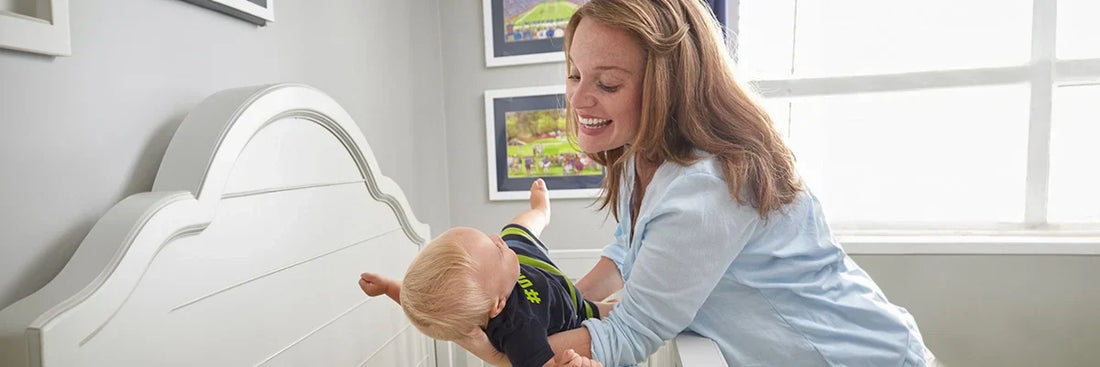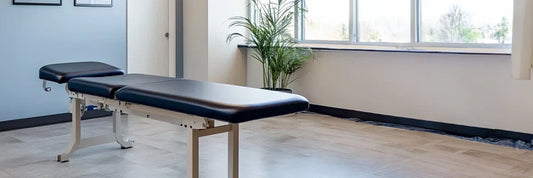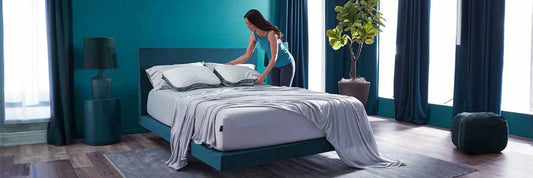
How Much Sleep Should My Child Get Each Night?
Did you know that one classic study found that half of all U.S. children will experience some sort of sleep issue as they grow? Sleepwalking, restless leg syndrome, nightmares, sleep apnea, and insomnia can make it hard for kids to doze off or sleep through the night. Fortunately, many of these conditions are short-lived.
As your child grows, keeping tabs on their sleep habits can help them feel healthier and happier. However, it's not always easy to tell if your child is getting enough sleep. When should parents worry?
Don't stress: We've got you covered! In addition to our cozy kids' bedding and cooling pillows, we've got the scoop on the recommended sleep for each child by age. Let's take a look at the best sleep schedule for your child and what to do if they need more rest.
Recommended Sleep for Newborns
Newborn infants need around 16-17 hours of sleep per day, including naps.
However, as any new parent will tell you, the sleep patterns of a newborn
can be hectic and inconsistent. At this age, babies' brains aren't yet able
to tell day from night. Without this circadian rhythm, the amount of sleep
they get and when they get it may vary from day to day.

Keeping things quiet before bedtime and during middle-of-night wakings can often help newborns settle down. The right breathable crib mattresses can also provide the support that finicky newborns need during sleep.
Recommended Sleep for Babies
Babies between 3-12 months old need around 12-16 hours of sleep each day, including naps.
At this age, babies often begin to fall into more consistent sleep cycles. Daytime naps are still common as they adjust, making up for the 6-8 hours of sleep they will get at night on average. They will often sleep through the night more frequently at this age.
Sticking to a regular naptime routine is the key to helping babies sleep at this stage. Be prepared for sleep regression, which is a period where many babies have sudden trouble sleeping for a few weeks.
Recommended Sleep for Toddlers
Toddlers between the ages of one and two need around 11-14 hours of sleep each day, including naps.
Often, nap frequency for kids at this age will decrease. Many toddlers will take just one nap per day. This is the stage where bedtime routines can become helpful, as consistent sleep habits are more likely to stick from here on out.
Coaxing toddlers to take naps is important for their sleep. Ensure a cozy, sleep-friendly setting by keeping the room quiet, dark, and cool around naptime. Toddler pillows can keep kids supported when they're determined to sit upright, but they're also comfortable enough to lull kids into nodding off.
Recommended Sleep for Preschoolers
 Preschoolers between the ages of three and five need around
10-13 hours of sleep
each day, including naps.
Preschoolers between the ages of three and five need around
10-13 hours of sleep
each day, including naps.
At this age, many preschoolers will stop napping as often or at all. Naps may be more common on tiring days, but most preschoolers will get the bulk of their sleep at night. As they start to pull back on napping, an earlier bedtime can help them get the healthy sleep they need.
This is also the age where screens often make it harder for kids to sleep. Be sure to turn off TVs, phones, tablets, and video games around an hour before bedtime.
Recommended Sleep for School-aged Kids
School-aged kids under the age of twelve will need around 9-12 hours of sleep each night.
The amount of sleep a school-aged child needs can vary wildly, as some children need more sleep than others. Younger children tend to need more sleep, while kids going into middle school may need less. A breathable mattress can help encourage deeper sleep if your child struggles to get enough rest.
As kids enter school, homework and other obligations can make it harder to get the sleep they need. Be sure to help them prioritize their work, use bedtime routines, and stay firm about bedtime. Don't forget to grab a kid-sized performance pillow for maximum support for any sleeping position.
Recommended Sleep for Teenagers
Teenagers need around 8-10 hours of sleep each night.
As they enter adolescence, a child's sleep patterns will continue to change. Many need less sleep than they used to, but it's also not uncommon for teens to need more sleep to maintain a healthy lifestyle. Growing teens may also need to upgrade from their childhood beds to larger mattresses for more spacious comfort.
Helping independent teens get enough sleep can be tricky. As much as possible, try to help them stick to regular bedtimes. It's especially important for them to avoid oversleeping on weekends, which can throw off their sleep schedule and make it harder to doze off at night.
Is Your Child Getting Enough Sleep?
Because there's such variation with kids and sleep, it can be hard to tell when your child is getting enough. Even if you're following the sleep recommendations for kids, your child may need more sleep than the typical child.
If your child isn't getting enough sleep for good health, you may notice
these things:

- They fall asleep during the day
- It's hard to wake them in the morning
- They struggle to concentrate
- They complain about headaches, especially in the morning
- They struggle with schoolwork
- They seem cranky or irritable
Caring for kids who struggle to sleep can be tough, but healthy sleep habits can help.
Make sure you've created a comfortable sleeping environment for them. Minimize screens before bed, stick to a firm sleep schedule, and use the same bedtime routine each day to give kids time to unwind. The right kids' bedding and cooling pillows for your child's needs can also make it easier for them to fall asleep.
Help Your Child Sleep Through the Night
No parent wants to see their child struggle with drowsiness and irritability. That's why it's crucial to follow the steps above to set a consistent sleep schedule for your kid. With a little forethought and the right bedtime routine, you can help your child sleep like a baby, no matter their age.
When you're ready to upgrade your child's sleep, we've got the sleep essentials to make a difference! From breathable sheets to moisture-wicking baby bedding, we'll make your child a happy sleeper. Shop our collection of kids' bedding today.



